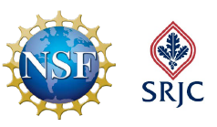Benefits
- Up to $4500/year for up to 3 years
- A faculty mentor for advice and support
- A community of fellow STEM students
- Gain skills to enhance your career
- Learn how and where to find and apply for STEM internships/jobs
Eligibility
- File a FAFSA and have financial need
- Major/intend to major in any STEM field
- Register for STEM major courses and a 1 unit STEM careers course
- Maintain an overall GPA of 3.0
- Be a US citizen or permanent resident
Applying
- The application period is currently closed.

Partial support is provided by the National Science Foundation under Award No. 1742635
MILES Events in 2023:
February 3:In the first par of the meeting, MILES scholars presented their experience with internships and research, and in the second part of the meeting, the scholars shared what internship or research experience they found interesting from searching databases and may consider applying for.
March 3: The students listened to a faculty panel on academic paths after transferring, including trajectories for bachelor's degree, master's degree, doctorate, and post-doctoral options, or industry career options. Students should have a clear idea of the various academic or career options they might consider after transferring. Facullty gave the students an idea of their experience with the various trajectories.
April 7:A field trip to the Laguna Treatment Plant – Santa Rosa’s local Water Reuse System.The plant staff members gave a tour of the plant to our MILES cohort. The Plant recycles approximately 7 billion gallons of wastewater each year and utilizes expertise of diverse careers in chemistry, biology, engineering, and physics.
May 12: A wrap-up meeting – a celebration of accomplishments. Students shared their accomplishments for the academic year in a social format. They also discussed and exchanged information about their careers plans for the summer and next year. Finally at this last cohort meeting, students provided feedback and reflections on the MILES program throughout its operation in the past years.
MILES Events in 2022:
February 4:[on Zoom] Professor Hsu moderated a discussion on "what is research?" Different modes of research methods were discussed, as well as the general framework of how research in science, math, and engineering is done.
March 4: [On Zoom] Prof. Matt Fontana asked the students to prepare and share answers to: who is a scientist you look up to and explain why? Each student was given two minutes to present. The workshop was aimed for self-identifying good science and engineering role models for the students.
April 1: An in-person field trip to Sonoma County Wildlife Rescue. Professor Famini gave us a tour of many native species, and presented hands-on application of biologic principles in action.
May 6: [On Zoom] Dean of College of Engineering at UC Davis gave a presentation about his invention, the Corsi-Rosenthal Box. Additionally, he gave an overview of his career path, starting at a community college and ending with a Ph.D. A nice Q&A followed.
September 4:[in-person] A welcome to the students in the new Cohort and continuing scholars. After introductions and Program and topics overview, the faculty members and students shared their backgrounds to help form advising faculty-student pairs for the year.
October 4:[in-person] Advising faculty shared information with the scholars about how to find and apply for internships and research opportunities in their respective fields. Students were asked to identify at least one opportunity for which they would consider applying.
November 4:[in-person] Professor Zoger presented a workshop to the scholars on how to make cold calls regarding the pursuit of professional prospects, including how to write emails to PIs with interesting research opportunities, how to network in the digital environment, and how to investigate, contact, and follow up with professional contacts.
December 2:[in-person] Prof. Marhenke conducted a workshop on mental self-care in college, techniques for managing stress and anxiety, organizing and prioritizing tasks and other techniques for mental wellbeing. Students answered questions on a worksheet and discussed in small groups to assess their mental habits.
MILES Events in 2021:
February 5:[on Zoom] MILES scholars were asked whether they have searched for reu or internship opportunities. They were asked to share which websites they searched. Also, those students who have submitted applications were asked to share where they were applying. If they participated in REU or internship in the past, they shared pictures of their experiences.
March 5: [On Zoom] Prof. Matt Fontana conducted a workshop on writing effective emails, including on how to maintain professional tone and etiquette with proper opening and closing. Students were broken into groups to write sample emails.
April 2: [On Zoom] A virtual field trip of Energy and Sustainability at our very own SRJC. Professors Bertch and Kmetko were live-streaming a tour through the campus in person, guided by the Manager of Energy and Sustainability David Liebman. He showed us the solar panels, batteries, the new microgrid gear that connects PG&E and the Heat Recovery Chiller in Burbank. MILES scholars had an opportunity to ask questions.
May 7: [On Zoom] A wrap up meeting for the year. We had a discussion on some current issues at the JC. The following questions were asked of students: 1. Did anyone attend the Blackout (an event concerning a statement of social justice) yesterday (Wednesday)? What are the issues? What have you learned? 2. We have seen a large drop in the number of applications for STEM scholarships this year. What experience have you had in applying for scholarships? What is your opinion why the applications decreased? 3. We have seen a large increase in unauthorized collaboration during on-line exams (cheating). These issues do not concern our highly eclectic group, but your opinion about what is happening, from a student perspective, would be interesting, especially as it relates to issues of fairness for hard working students. 4. We are interested to hear your plans for the summer and next year. We will be making a stipend available to MILES students who can find unfunded research opportunities at accredited institutions. Would you be interested in finding such opportunity and obtaining this money from MILES?
September 3: [On Zoom] Welcome to the students in the new Cohort and continuing students. Students were introduced to each other and to the faculty mentors. We went over the Program benefits and expectations.
October 1: [On Zoom] The assistant director of undergraduate admissions at UC Berkeley gave a presentation on the UC transfer process, and specifically about Berkeley requirements for different academic colleges, and including information on how to submit a competitive application."
November 5:[On Zoom] We discussed where to find and how to apply for internship and research opportunities in STEM. Students who have already done an REU or an internship were encouraged to share their experience.
December 3: [On Zoom]1. Faculty mentors checked with their advisees that they have looked over research and internship opportunities that we discussed last time. Students were asked to identify and be prepared to share at least one opportunity that interests them. 2. We discussed how tight finances can impact focusing on school and academic performance. Our hope was to give the students an opportunity to share experiences and to listen, so that if they are facing financial struggles, they are not feeling alone. One of our MILES Scholars published an article on how a lack of resources can impact lives and shared it with his peers. He moderated the meeting.
MILES Events in 2020:
February 7: Staff from the SRJC Office of Scholarships presented to the students on finances, financial aid, scholarships, the difference between need-based and merit based aid, the calculators, and how academic performance may affect finances, followed by Q&A with the students.
March 6: Prof. Jonathan Marhenke conducted a workshop on mental self-care in College, techniques for managing stress and anxiety, organizing and prioritizing tasks and other techniques for mental wellbeing. Students answered questions on a worksheet and discussed in small groups to assess their mental habits.
April 3: [On Zoom] Representatives from UC Davis presented the McNair Scholars Program. This Program is funded by the U.S. DoE and is designed to prepare undergraduate students for doctoral studies through involvement in research and other scholarly activities. Our community college students are especially well-suited to benefit from the participation and have been strongly encouraged to apply when they transfer. Our students appreciated the overview of the typical path to obtaining a doctoral degree in sciences; many of them were unaware what the path entails.
May 1: [On Zoom] A wrap-up meeting – a celebration of accomplishments. Students shared their accomplishments for the academic year in a social format. They also discussed and exchanged information about their careers plans for the summer and next year.
September 4: [On Zoom] Welcome to the students in the new Cohort and continuing students. After introductions and Program overview and after covering the benefits and expectations of the Program, students participated in ice-breakers and interactive games.
October 2: [On Zoom] School closed for fire-related evacuations. However, faculty mentors made themselves available in this optional meeting to provide students with information on students emergency financial aid and access to support services. Moreover, students shared their thoughts on the remote-instruction and whether and how learning on-line is affecting their academic career plans in STEM.
November 6:[On Zoom] A field trip to the Laguna Treatment Plant – Santa Rosa’s local Water Reuse System. Two faculty members travelled to the plant in-person and streamed the tour on Zoom. Two plant staff members joined on Zoom to give a presentation. Then, students were able to interact during the streamed tour with another staff member, showing the facility in person. The Plant recycles approximately 7 billion gallons of wastewater each year and utilizes expertise of diverse careers in chemistry, biology, engineering, and physics.
December 4: [On Zoom] A panel of STEM faculty conducted a workshop on “how to search for and apply to research opportunities and internships.” The faculty mentors shared with MILES scholars field-specific information as well.
MILES Events in 2019:
February 2: Prof. Cortney Schultz: “On Reading Apprenticeship”. Strategies for effective reading of science and technical textbooks. Students were asked to read three pages from a Math textbook, first without, then with tips for efficient learning by reading.
March 1: Prof. Jonathan Marhenke: “Hands-on Chemistry: Fun with Hydrophilic and Hydrophobic Interactions.” The first session in a series of cross-discipline, student-centered hands on activities to show them facilities outside of their major and to encourage collaboration and bonding. Students toured a Chemistry lab and participated in a fun competition project testing hydrophobicity of various materials.
April 5: Prof. Vince Bertsch: A tour of the SRJC makers and fabrication space – opportunities for space sharing and collaboration among disciplines, followed by a presentation about the internship experience by a MILES student.
May 3: A Field Trip to the U.S. Army Corps of Engineers Bay Model in Sausalito, CA. The Bay Model is a working hydraulic scale model of the San Francisco Bay and Sacramento-San Joaquin River Delta System. Students enjoyed visiting the model and shared a meal after, in celebration of completing the first year of the Program.
September 6: Faculty Members: “Introductions, Program Overview, and an interactive Game: Benefits and Responsibilities in the MILES Program” and Cohort 2 welcome. After covering the benefits and expectations of the Program, Students participated in ice-breaker introductions and interactive games.
October 4: A student organized panel on research and internship experiences in STEM, moderated by a MILES student leader. Five students shared (with slides and photographs) their experiences with their research and internships that they participated in last summer and answered questions.
November 1: school closed for fire-related evacuations.
December 6: Workshop on: “How to Search for and How to Apply for Reseach Opportunities and Internships in Your Discipline.” Professor Abigail Zoger gave the introduction, then the Faculty mentors and students broke into small groups and discussed opportunities and the application format specific to their fields.
MILES Events in 2018:
September 7: Faculty Members: “Introductions, Program Overview, and an Interactive Game: Benefits and Responsibilities in the MILES Program”. Students participated in ice-breaker introductions and interactive games that covered the benefits and expectations of the Program.
October 5: Prof. Abigail Zoger: ‘’Chunking, Core Concepts and Your Discipline’’. Strategies for effective learning. After the presentation, students were grouped with their discipline Faculty members and discussed how these strategies apply in studying materials in their respective STEM fields.
November 2: SRJC President, Dr. Chong: “Welcome and Remarks.” Our College President emphasized the importance of STEM fields on our Campus and welcomed the students into the Program.
Prof. Jan Kmetko: “Fixed and Growth Mind Sets.” How to view struggles in STEM as a path to success, keys to improving motivation, cultivating positive attitudes, self-perception, and self-worth. Students were asked about their academic struggles and were presented with strategies on how to frame them into growth opportunities.
December 7: Faculty Members: “Overviews of Internship Opportunities, How to Search for and How to Apply in Your Discipline.” Faculty members took turns in presenting information about professional organizations and societies in their respective fields and availability for student work or internships in their respective areas.
| MILES students are more likely to know where to find research opportunities and internships than their peers without access to faculty advising. Compare the response rate to the question in the chart on the right. |

